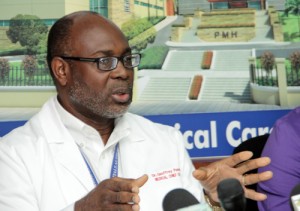NASSAU, The Bahamas – Medical officials at the Princess Margaret Hospital say they have taken all of the necessary steps to combat and contain the spread of the organism Acinetobacter Baumannil that led to the deaths of two premature infants in the hospital’s Neonatal Intensive Care Unit (NICU).

Dr. Geoffrey Pennerman, Medical Chief of Staff, Princess Margaret Hospital, said the hospital’s Infection Control Unit examined all clinical procedures to ensure compliance by all persons providing care and that it was determined that adherence to strict infection control practices as it relates to hand-washing, decontamination and environmental control practices had taken place.
He said, as the organism thrives in water, all water containing equipment in the Unit such as humidifiers and mechanic ventilators and the hoses that may be attached to them were tested.
“We did not find the organism in those areas,” he added.
Dr. Pennerman said additional tests were performed on the air-conditioning units and the coils.
“We thought there was some suspicious activity going on with one of the coils, but we are awaiting confirmation (or non-confirmation) in that regard.”
Dr. Pennerman said all of the babies in the Neonatal Intensive Care Unit are born prematurely – some in as little as 16 weeks – and that as a result, cannot fight off infections due to the fact that some of their body parts may not be fully formed or functioning.
He said that medical personnel in the Unit are aware of this inability for the premature babies to fight off infections on their own and constantly monitor them to ensure that there are no infections.
“In many countries of the world, including developed countries, many of the babies we care for (at the PMH) are considered miscarriages and no attempt is made to care for them,” Dr. Pennerman said.
“We care for babies that are much smaller and much more critically ill than in most countries. This is accomplished through hard, dedicated work and paying attention to details regarding their condition on a continual basis.”
Dr. Pennerman said once the Infection Control Officer at the Princess Margaret Hospital identified a trend of the organism in the patient population at NICU on July 18, the Officer immediately alerted Hospital Management.
He said an outbreak was declared and steps were “immediately taken” to contain the spread of the organism, and an investigation launched.
All babies in the NICU were tested for the infection with eight testing positive. Two infants succumbed.
“The patients involved were premature babies with immature immune systems which are unable to fight infection,” Dr. Pennerman said. “The infants testing positive were all critically ill and on a mechanical ventilator.”
Dr. Pennerman said continued screening has revealed that five of the infants are colonised. All are stable. Colonisation is when a bacteria is present in the swab area, but not causing disease.
“Hospital management wishes to reassure the public of our ongoing efforts to reduce the likelihood of such a re-occurrence,” Dr. Pennerman added.







